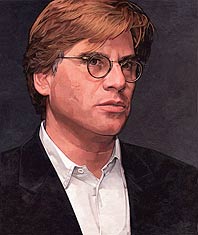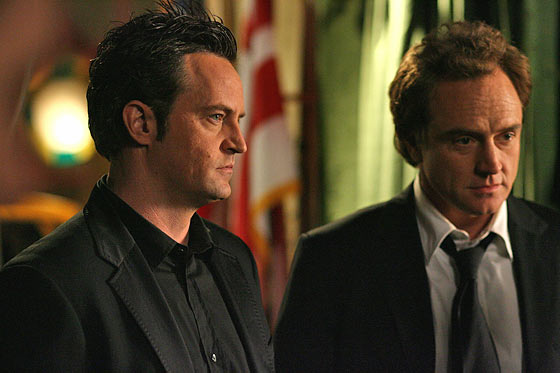
After the first nine minutes of the premiere episode of Studio 60 on the Sunset Strip, you might be inclined to think, Thank God—the grown-ups are back on TV. In a fall season that’s heavy on kidnapped children, people with superpowers, and yet more fascinating peeks into the world of police forensics, Studio 60 feels like an invitation to leave the kiddie table and dine with the adults. Take this sample exchange: “What if I go on air with this sketch?” says the beleaguered producer when a controversial bit gets nixed.
“I’m not going to answer that,” says the network stooge.
“Why not?”
“Because if you still had the muscle to do it, you wouldn’t have asked.”
But then, this is what we’ve come to expect from Aaron Sorkin, the 45-year-old boy genius from Scarsdale and TV’s reigning savant of spitfire dialogue and smarty-pants standoffs. His shows don’t unfold, they zip, and keep zipping, their metabolism humming at a higher rate than anything else on the dial. He was last seen back in 2003, crafting a fantasy government on The West Wing and briefly swiping The Sopranos’ Emmy title belt. After an embarrassing airport drug arrest (crack, marijuana, ’shrooms), a testy ouster from The West Wing (overwork, delays), and a hiatus, he’s returned to TV—both to the medium, with this new series, and to the subject, which he last explored on his first series, Sports Night, which ran on ABC from 1998 to 2000.
Television should be the perfect subject for Sorkin. No one’s better suited to imbue control-room banter—“Ready: camera one! Go VTR now!”—with the barked portent of a shuttle launch. Sure enough, Studio 60 opens like a blastoff: After the network weenie cuts the offensive sketch, the show’s producer Wes Mendell (Judd Hirsch) ambushes his own program, clearing the set and delivering a live-to-air tirade on the evils of TV. Cue the panic: control-room chaos, a stunned studio audience, and, elsewhere in L.A., a posh dinner full of chortling studio executives that’s cut short by a chorus of jangling cell phones.
This beginning—complete with explicit nods to Network’s Paddy Chayefsky, couched in a clever joke about insipid anchorperson segues—might be the best nine minutes of TV you’ll watch all season. How you feel about the rest of the hour, however, will depend on what you think of Aaron Sorkin, because his new show is fueled so directly by what Aaron Sorkin thinks of himself.
Network TV is not a medium that fosters auteurs, but Sorkin fits the description best. Unlike, say, David E. Kelley, whose fizzy shows (Ally McBeal) have spawned a nursery full of clones (Grey’s Anatomy), Sorkin’s trademark tics are hard to replicate. And he’s followed the British model for creating TV, single-handedly churning out entire seasons, at times during infamous drug-chugging marathons, hunkered down in a hotel room.
Every writer borrows from his experiences, but “Studio 60” is so autobiographical that Sorkin upstages his creation.
With Studio 60, Sorkin revisits a favorite motif: the workplace as idealized family. In Sorkin Land, every worker is smart, every decision important, everyone works deep into the night, and every conversation is as crisp as a good stump speech, rattled off without notes. Studio 60 preaches the same religion. Much has been made of its debt to Saturday Night Live, but they don’t have much in common unless you think Lorne Michaels is likely to interrupt his show to damn your TV remote as “a crack pipe.”
Still, given that Sorkin’s White House seemed so authentic in its details, you’d expect him to nail every nuance of the late-night comedy world, from the egos to the slang. Instead, in its first hour, Studio 60 is surprisingly, even alarmingly tin-eared. After Mendell’s meltdown, the neophyte studio president (Amanda Peet) decides the only way to salvage the show’s public prestige is to rehire a superstar writer-and-director team (Matthew Perry and Bradley Whitford) that had been jettisoned. Say what? Can you name even a single writer or director from Saturday Night Live’s entire history, save maybe Conan O’Brien and Tina Fey (who’s busy launching 30 Rock, an SNL spinoff of her own)? More to the point, if Lorne Michaels ever did implode, would the public treat it like a cultural emergency? The clip would be posted on YouTube, laughed about for a weekend, and then the show’s demographic would head back to CollegeHumor.com.
But wait—there is one case of a high-profile writer and director being publicly exiled from their own successful show: Sorkin and Thomas Schlamme, on The West Wing, in 2003. The parallels are hard to ignore. You wonder if anyone politely suggested to Sorkin that his redemptive story line might be problematic. (Or, for that matter, the line of dialogue in which an actor announces, “It took four years, but the show collapsed without them.”) Every writer has a right, and an imperative, to borrow from his experiences, but Studio 60 is so baldly autobiographical that Sorkin upstages his creation. It’s not a show about a comedy franchise; it’s a show about Sorkin’s career.

To better understand Studio 60, take a look back at Sorkin’s first TV venture, Sports Night. That show also centered on a relatively trifling TV product (an ESPN-esque sports-highlight show) and a male friendship (the show’s two anchors). That show’s pilot also featured a speech in which one of the principals announces he won’t be held hostage to a viewing audience of 11-year-old boys. (On Studio 60, the boorish viewers are 12-year-olds, a slight bump in the average age of philistines.)
And in Sports Night, one anchor gives a fervid speech to his colleague about how your co-workers are your true family, a clan more reliable and steadfast, certainly, than his co-worker’s bitch of an ex-wife. This is Sorkin’s credo: Your life is your work is your life. In Studio 60, it’s Perry and Whitford—the wronged, expelled geniuses—who swap drug-relapse confessions and share the manly hugs. Then they trot out to address their new charges, one of whom, like Tiny Tim, asks with a quavering voice, “Are you coming to save us?”
Sorkin’s coming to save us. And, while he’s at it, to rewrite his own history. Studio 60 is a grown-up show with a schoolyard agenda: prime-time drama as vindication fantasy. There is no end of dramatic—and, Lord knows, comedic—possibility in a behind-the-curtain look at late-night comedy, but Sorkin focuses instead on a redemption tale about TV creators who are treated like saviors and welcomed back with hosannas. The extent to which you’ll root for Sorkin and his Studio 60 stand-ins, however, depends on whether you too can equate the running of a TV show with the running of the free world and cheer the return of its deposed, disgruntled king.